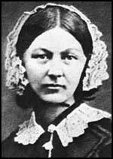
Florence Nightingale
May 12, 1820 – August 13, 1910
Florence Nightingale, the daughter of the wealthy landowner, William Nightingale of Embly Park, Hampshire, is credited with pioneering modern nursing, was born in Florence, Italy. The family returned to England when Miss Nightingale was one years of age in 1821.
In spite of the advantages for being born into a prominent wealthy family, she did not want to settle for a life of marriage nor content to do good works on the estates with her mother and sister; she pondered on the need for charity and the causes of poverty and unemployment."
Biographer, Colin Matthew, has pointed out: "Florence was a good mimic, attractive to men, and had a number of suitors; many of the men she met through her parents remained lifelong friends....” Florence refused to marry several suitors, and at the age of twenty-five told her parents she wanted to become a nurse. Her parents were totally opposed to the idea as nursing was associated with working class women.
May 12, 1820 – August 13, 1910
Florence Nightingale, the daughter of the wealthy landowner, William Nightingale of Embly Park, Hampshire, is credited with pioneering modern nursing, was born in Florence, Italy. The family returned to England when Miss Nightingale was one years of age in 1821.
In spite of the advantages for being born into a prominent wealthy family, she did not want to settle for a life of marriage nor content to do good works on the estates with her mother and sister; she pondered on the need for charity and the causes of poverty and unemployment."
Biographer, Colin Matthew, has pointed out: "Florence was a good mimic, attractive to men, and had a number of suitors; many of the men she met through her parents remained lifelong friends....” Florence refused to marry several suitors, and at the age of twenty-five told her parents she wanted to become a nurse. Her parents were totally opposed to the idea as nursing was associated with working class women.
“Florence's desire to have a career in medicine was reinforced when she met Elizabeth Blackwell at St. Bartholomew's Hospital in London. Blackwell was the first woman to qualify as a doctor in the United States. Blackwell, who had to overcome considerable prejudice to achieve her ambition, encouraged her to keep trying and in 1851 Florence's father gave her permission to train as a nurse.” Spartacus Educational
She came to prominence while serving as a nurse during the Crimean War, where she tended to wounded soldiers. She was known as "The Lady with the Lamp" after her habit of making rounds at night. On October 21,1854, she and the staff of 38 women volunteer nurses that she trained, including her aunt Mai Smith, and fifteen Catholic nuns were sent under the authorization of Sidney Herbert to the Ottoman Empire.
When Nightingale arrived early in November 1854 at Selimiye Barracks in Scutari, she and her team found that poor care for wounded soldiers was being delivered by overworked medical staff, medicines were in short supply, hygiene was being neglected, and mass infections were common, many fatal.
These are the events which led Miss Nightingale to become an advocate for better delivery of care and sanitation for the soldiers. For more information about Nightingale's role in shaping nursing as well as other accomplishments, click/tap on the links to Spartacus Educational and/or Wikipedia
For Miss Nightingale's entire story
She came to prominence while serving as a nurse during the Crimean War, where she tended to wounded soldiers. She was known as "The Lady with the Lamp" after her habit of making rounds at night. On October 21,1854, she and the staff of 38 women volunteer nurses that she trained, including her aunt Mai Smith, and fifteen Catholic nuns were sent under the authorization of Sidney Herbert to the Ottoman Empire.
When Nightingale arrived early in November 1854 at Selimiye Barracks in Scutari, she and her team found that poor care for wounded soldiers was being delivered by overworked medical staff, medicines were in short supply, hygiene was being neglected, and mass infections were common, many fatal.
These are the events which led Miss Nightingale to become an advocate for better delivery of care and sanitation for the soldiers. For more information about Nightingale's role in shaping nursing as well as other accomplishments, click/tap on the links to Spartacus Educational and/or Wikipedia
For Miss Nightingale's entire story
 RSS Feed
RSS Feed

